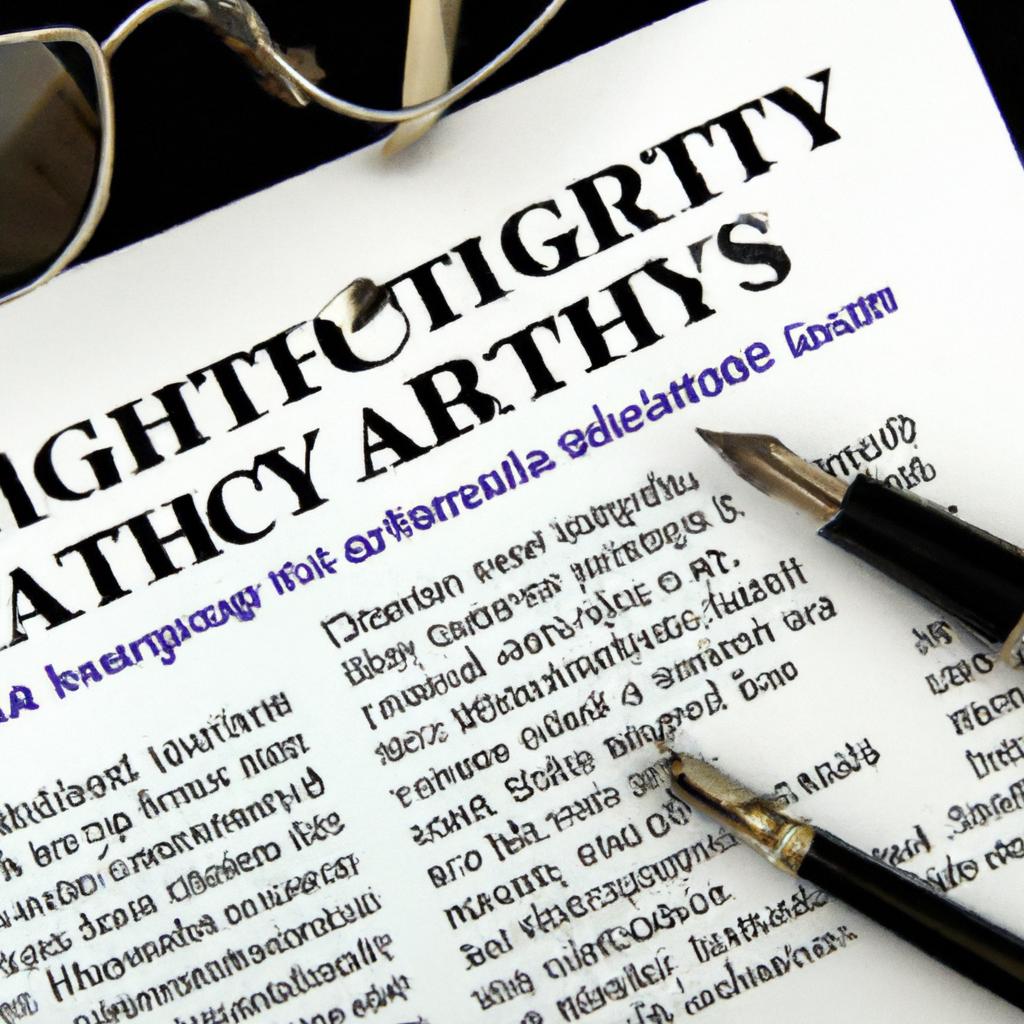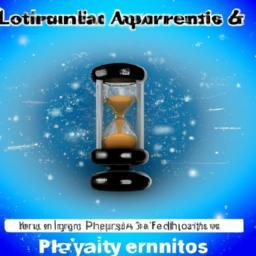As guardians of the law, we lawyers are tasked with unraveling the complex threads that weave together the legal fabric of society. In the realm of estate planning, one particular legal tool stands as a stalwart protector of individual autonomy and financial security: the power of attorney. In this article, we will delve into the intricate nuances of power of attorney rights and limitations, shedding light on this formidable instrument that empowers individuals to make crucial decisions in times of need. At Morgan Legal Group in New York City, we specialize in navigating the intricate terrain of estate planning, probate, elder law, wills, and trusts. Join us as we explore the pivotal role of power of attorney in safeguarding your interests and securing your legacy.
Understanding the Scope of Power of Attorney Rights
When it comes to , it is crucial to be aware of both the privileges and limitations that come with such authority. A power of attorney is a legal document that grants an individual, known as the agent or attorney-in-fact, the power to act on behalf of another person, known as the principal. This authority is typically granted for a specific purpose and for a designated period of time.
It is important to note that while a power of attorney can be a valuable tool in managing a principal’s affairs, there are certain restrictions and limitations that must be adhered to. Some key points to consider include:
- Scope of Power: The agent’s authority is limited to the specific powers outlined in the power of attorney document.
- Fiduciary Duty: The agent must act in the best interests of the principal and avoid any conflicts of interest.
- Duration: The power of attorney may expire upon a certain event, such as the principal becoming incapacitated.

Navigating the Limitations of Power of Attorney Authority
When it comes to power of attorney rights and limitations, it is crucial for individuals to understand the extent of authority granted to their chosen agent. While a power of attorney can be a powerful tool in managing financial and legal affairs, there are certain limitations that must be navigated carefully to avoid potential issues or disputes.
It is important to note that the authority granted to an agent through a power of attorney is not unlimited. There are specific actions and decisions that an agent may not have the power to make, such as changing the principal’s will, making gifts on behalf of the principal, or making decisions regarding healthcare and medical treatment. Understanding these limitations and ensuring that the power of attorney document is clear and comprehensive can help prevent misunderstandings and protect the principal’s interests.

Key Considerations for Drafting a Comprehensive Power of Attorney Document
When drafting a comprehensive power of attorney document, it is crucial to consider all rights and limitations that come with granting someone else the authority to make decisions on your behalf. One key consideration is the scope of the powers being granted. It is important to clearly outline what decisions the agent can make, such as financial, healthcare, or legal matters, and to specify any limitations on those powers.
Another important consideration is choosing a trustworthy and reliable agent. Selecting someone who will act in your best interests and follow your wishes is essential for a power of attorney to be effective. It is also important to include provisions for monitoring the agent’s actions and ensuring accountability. By carefully considering these key factors, you can create a power of attorney document that will protect your rights and best interests.

Ensuring Compliance with Legal Requirements for Power of Attorney Execution
When executing a power of attorney, it is crucial to ensure compliance with legal requirements to protect both the principal and the attorney-in-fact. Understanding the rights and limitations of a power of attorney can help prevent abuse and ensure that the document is valid and enforceable. Here are some key points to consider when drafting and executing a power of attorney:
- Capacity: The principal must have the mental capacity to understand the nature and effect of the power of attorney.
- Voluntariness: The power of attorney must be executed voluntarily, without any undue influence or coercion.
- Witnesses: Depending on state law, the power of attorney may need to be signed and witnessed by one or more disinterested witnesses.
| Requirement | Description |
|---|---|
| Notarization | In some states, the power of attorney must be notarized to be valid. |
| Revocation | The principal can revoke the power of attorney at any time, as long as they have the capacity to do so. |
Q&A
Q: What is a power of attorney and how does it work?
A: A power of attorney is a legal document that gives someone else the authority to make decisions on your behalf. This can include financial, legal, and healthcare decisions.
Q: What are the different types of power of attorney?
A: There are two main types of power of attorney: general and limited. A general power of attorney gives the designated person broad authority to make decisions on your behalf. A limited power of attorney restricts the person’s authority to specific tasks or time periods.
Q: What are the limitations of a power of attorney?
A: While a power of attorney can be a useful tool, there are certain limitations to consider. For example, a power of attorney does not grant the designated person the authority to make decisions after your death. Additionally, some actions, such as changing a will, require specific legal documents beyond a power of attorney.
Q: Can a power of attorney be revoked?
A: Yes, a power of attorney can be revoked at any time by the person who granted it. This can be done by creating a new power of attorney document, notifying the designated person in writing, or simply tearing up the existing document.
Q: How can someone ensure their power of attorney rights are protected?
A: To protect your power of attorney rights, it’s important to choose a trusted individual to act as your agent. Additionally, clearly outline the scope of their authority in the document itself. Regularly reviewing and updating your power of attorney can also help ensure your wishes are carried out properly.
In Summary
In conclusion, understanding the power of attorney rights and limitations is crucial to ensuring that one’s best interests are protected in times of incapacity. By having a clear understanding of what a power of attorney can and cannot do, individuals can make informed decisions about who they trust to act on their behalf. Remember, with great power comes great responsibility, and knowing the bounds of that power is essential for a harmonious relationship between the principal and the attorney-in-fact. So, next time you consider granting someone power of attorney, remember to choose wisely and keep these limitations in mind. Stay informed, stay empowered.
 The power of attorney is a legal document that allows an individual (known as the “principal”) to appoint another person (known as the “attorney-in-fact” or “agent”) to make decisions on their behalf. This document gives the agent the authority to act in various matters, including financial, legal, and healthcare decisions, when the principal is unable to do so on their own. While the power of attorney can grant a significant amount of power to the agent, it also comes with certain rights and limitations that must be understood before signing the document.
The power of attorney is a legal document that allows an individual (known as the “principal”) to appoint another person (known as the “attorney-in-fact” or “agent”) to make decisions on their behalf. This document gives the agent the authority to act in various matters, including financial, legal, and healthcare decisions, when the principal is unable to do so on their own. While the power of attorney can grant a significant amount of power to the agent, it also comes with certain rights and limitations that must be understood before signing the document.
Understanding the Rights of the Agent
When an individual grants someone power of attorney, they are essentially giving them the power to act as their proxy or representative. This means that the agent has the right to make decisions and act in the best interest of the principal. Some of the specific rights granted to agents in a power of attorney include:
1. Making Financial Decisions
One of the most common types of power of attorney is the financial power of attorney, which gives the agent the right to handle the principal’s finances. This can include paying bills, managing investments, or making financial decisions on their behalf.
2. Making Legal Decisions
In some cases, the agent may also have the authority to make legal decisions on behalf of the principal. This can include signing legal documents or handling legal disputes.
3. Making Healthcare Decisions
A healthcare power of attorney grants the agent the right to make medical decisions for the principal if they are unable to do so. This can include choosing doctors, consenting to medical treatment, or making end-of-life decisions.
4. Access to Information
When acting as the agent, individuals have the right to access the principal’s financial, legal, and healthcare records, unless specified otherwise in the document.
Understanding the Limitations of the Agent
While the power of attorney grants significant rights to the agent, it also comes with specific limitations that must be understood and followed. These limitations are in place to protect the principal’s best interest and prevent any misuse of the power granted to the agent.
1. Fiduciary Duty
The agent is legally bound to act in the best interest of the principal and make decisions that benefit them. This is known as a fiduciary duty, and any violation of this duty can result in legal consequences for the agent.
2. Limited Decision-Making Authority
The principal has the ability to specify the scope and limitations of the agent’s authority in the power of attorney document. If a decision falls outside of this scope, the agent does not have the legal right to make it.
3. Accountability
The agent must keep detailed records of all actions taken on behalf of the principal. They may also be required to provide regular reports and account for any financial or legal decisions made.
4. Termination of Power
The power of attorney can be terminated by the principal at any time, as long as they are of sound mind and able to make decisions. If the principal becomes incapacitated, the power of attorney will typically terminate automatically.
Benefits and Practical Tips
The power of attorney can provide individuals with peace of mind knowing that their affairs will be managed by someone they trust in the event of incapacity. It also avoids the need for a court-appointed guardian, which can be a lengthy and costly process. To ensure the power of attorney is effective and beneficial, here are some practical tips to keep in mind:
1. Choose a Trusted Agent
The most crucial factor in establishing a power of attorney is selecting an agent who is trustworthy, reliable, and capable of handling the responsibilities outlined in the document.
2. Specify the Scope and Limitations
To avoid any confusion or potential misuse of power, it is essential to clearly specify the scope and limitations of the agent’s authority in the power of attorney document.
3. Keep the Document Updated
Life circumstances can change, and it is essential to review and update the power of attorney regularly to ensure it reflects the principal’s current wishes and needs.
Case Studies and First-Hand Experiences
Example 1:
John’s elderly father had granted him power of attorney to take care of his finances and manage his healthcare decisions. When his father was hospitalized for an extended period, John’s power of attorney allowed him to make medical decisions, including choosing doctors and giving consent for treatment. It also allowed him to handle his father’s financial affairs, such as paying bills and managing investments, without any legal complications.
Example 2:
Michael signed a durable power of attorney, granting his sister the authority to handle his finances in case he became incapacitated. However, he also specified in the document that his sister could not make any investments without his approval. This limitation protected Michael’s assets and ensured they were only used for his benefit.
In conclusion, the power of attorney can be a powerful legal document that provides an individual with the peace of mind that their affairs will be managed by someone they trust in case of incapacity. While it grants significant rights to the agent, it also has specific limitations that must be followed to protect the principal’s best interest. By understanding the rights and limitations of the agent and following practical tips, individuals can ensure that the power of attorney functions effectively for their benefit.






